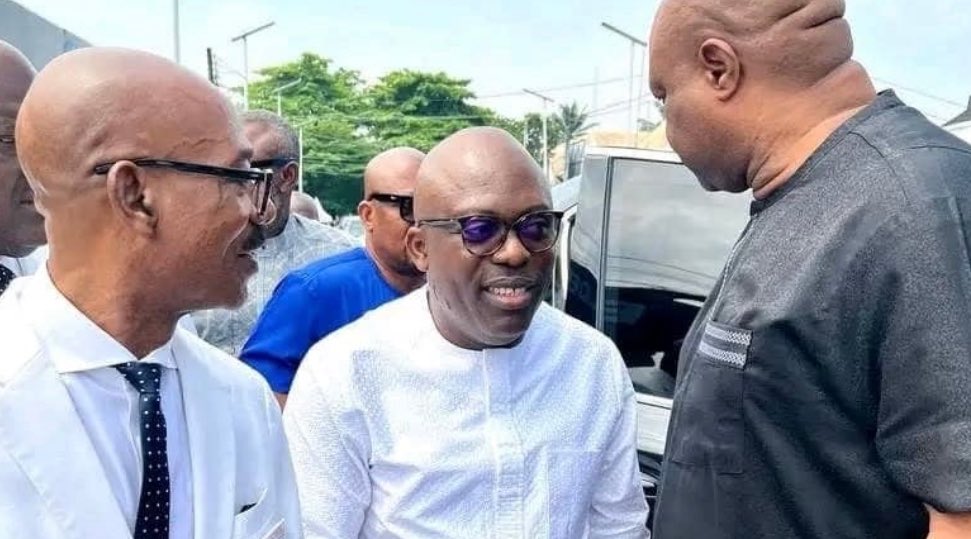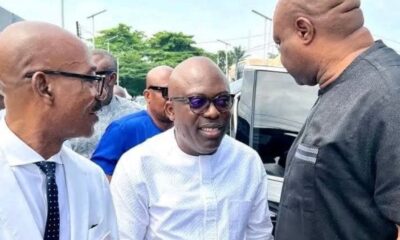NEWS
ITF And How Not To Reward A Patriot

By Benedict Aguele
The Industrial Training Fund has been in the news of late for leading a revolution in the technological space in the country. One of the reasons is the recent launch of made in Nigeria Android phone, ITF Mobile with 100% locally sourced materials.
I was impressed, to say the least, and that ignited my interest in the ITF, and the revelations have been mind-boggling. As a start, the ITF, an agency under the Federal Ministry of Trade and Investment, and established in 1971, has not only raised training consciousness in the economy but has also helped in generating a corps of skilled indigenous manpower which has been manning and managing various sectors of the national economy.
In those days, at the mention of ITF, the thought of students’ placement on industrial training readily comes to mind. This erroneous impression is that everything about the ITF starts and ends with certifying students’ industrial training experience.
I dare say a lot has changed in the operations of the ITF under the leadership of Joseph Ari as the director-general. After detailed scrutiny of the ITF in the last five years, I speak on good authority that, indeed, there has been a revolution in the agency. One of the signs is the manufacturing of the ITF Mobile, the first made in Nigeria smartphone.
I gathered from reliable sources that the ITF had also been silently finetuning skilled indigenous manpower in various sectors of the economy through the revamping of the ITF Model Skills Training Centre.
The Model Skills Training Centre was established by the Industrial Training Fund as a Post-Secondary Technical Institution in 2011 to provide industry-relevant career and technical education programmes for secondary school leavers and adult learners. It was a two-pronged effort by the Federal government to actualise the millennium development goals. To date, the Model Skills Training Centre (MSTC) is progressing in developing the nation’s economy through its highly Skilled Human Resource.
In 2016, the MSTC formally applied to the National Board for Technical Education (NBTE), which is mandated to accord approvals on prospective TVET programmes to include specific programmes for critique/vetting and development in the National Vocational Certificate (NVC) component. This was closely followed by another critique exercise request to add the National Innovative Diploma (NID) component to its certification status.
In 2017, the MSTC was granted approval to operate as an Innovative Enterprise Institute (IEI), with effect from December 2016, to offer programmes in the two components of NID/NVC. Admission into the MSTC is now through JAMB for the NID programmes that run for Two (2) years and direct admissions for the Modular programmes that run for four weeks to 24 weeks. Today the Centre is a Model in TVET Nigeria and the West African sub-region.
This brings me to the leadership question in Nigeria. I have long stated in numerous forums that leadership is required to set the country on the path of greatness. Using the ITF as an example, we could see how credible leadership has resulted in groundbreaking initiatives that make every Nigerian proud. Let’s rewind; if the director-general of the ITF, Joseph Ari, had toed the line of his predecessors in office, I am sure the ITF would have remained that agency responsible for student’s placement for industrial training exercises alone.
We should learn to call a spade a spade and celebrate those who have displayed acts of ingenuity in service to the country. The story of Joseph Ari at the ITF comes readily as a worthy example for leading the revolution at the agency in the last five years of his stewardship.
I gathered that it’s about service for him, and this could be felt in the manner the agency has been able to carry out its mandate effortlessly. This, in my considered opinion, answers the leadership question that is needed in the country.
The likes of Joseph Ari have proven that leadership is not rocket science; therefore, there are no ‘set’ qualities that have to be present in all leaders. Instead, an effective leader draws from a range of personal qualities to help them deal with different circumstances and challenges. This is the Joseph Ari story at the ITF and why he should be celebrated and not castigated. Unfortunately, this is the country we have found ourselves in, where some does not want to see anything progress and where the ultimate aim is to pull down rather than uplift.
I have been reading some mischievous publications on Joseph Ari recently, and I could not help but laugh in utmost disbelief. And I said to myself, how can we make progress as a country when good deeds are detestable, and blackmail is the order of the day.
I hold the firm opinion that the media has a role to play in ensuring that malicious and mischievous intentions are not promoted at the expense of the integrity of those with a solid commitment to providing credible leadership in the country.
The implication of the above is that should mischievous elements get the upper hand, we can be assured that the country would be thrown to the dogs, and sustainable growth and development would elude us.
Those that are envious of the sterling leadership of Mr Joseph Ari at the ITF should do well to swallow their pride and desist from the well-orchestrated slander campaign launched in the media, which might be as a result of the exploits recorded by the agency under his watch and in record time.
In my considered opinion, I think the narrative on the Joseph Ari led ITF should be on how leadership has transformed a once docile agency to a proactive and result-oriented agency. My two cents.
Agule is a strategic communication expert and wrote this piece from Abuja.
NEWS
JUST-IN: Gov Fubara returns to Port Harcourt as Tinubu ends Emergency Rule

Rivers State Governor, Siminalayi Fubara, returned to the state on Friday, landing at the Port Harcourt International Airport, Omagwa, at about 11:55 a.m. to the cheers of his supporters who trooped out to welcome him.
His return comes hours after President Bola Tinubu lifted the emergency rule imposed on the state on March 18, following a political crisis that saw Fubara and his deputy, Ngozi Odu, suspended from office.
Despite his arrival, the governor had yet to resume at the Government House office as of Friday afternoon. On Thursday, the Rivers State House of Assembly reconvened, but hundreds of Fubara’s supporters who had gathered at the Government House in anticipation of his return waited in vain.
During the emergency rule, Tinubu appointed retired Admiral Ibok-Ete Ibas as sole administrator to oversee the state. In a farewell broadcast on Wednesday, Ibas handed over power and urged political actors in Rivers to embrace dialogue and mutual respect.
The crisis in the state began after Fubara fell out with his predecessor, Nyesom Wike, now Minister of the Federal Capital Territory, over control of Rivers’ political structure. The feud split the state assembly and escalated into violent confrontations.
In June, Tinubu convened a reconciliation meeting with Fubara, Wike, Assembly Speaker Martin Amaewhule, and other key stakeholders.
By July, Ibas inaugurated the Rivers State Independent Electoral Commission (RSIEC), led by Michael Odey, which conducted council elections across the state on August 30.
The All Progressives Congress (APC) won 20 local government areas, while the Peoples Democratic Party (PDP) secured three.
NEWS
Nigerian Born Int’l Journalist, Livinus Chibuike Victor, attempts to attain Interviewing Marathon of 72hours 30 Seconds

Journalists plays an essential role in promoting transparency, challenging power, and giving a voice to the voiceless. Despite increasing threats to press freedom across the world.
As the world reflects on the vital role journalists play in upholding democratic values, Livinus Chibuike Victor, Imo State born globally acclaimed journalist, proudly announce a historic Guinness World Record attempt for the longest interviewing marathon, with the Theme (NIGERIA OUR STRENGTH) scheduled to take place from 28th September to October 1st 2025, at Tangier Hotel, 34, Ekukinam street, Besides ABC Transport, Utako, Abuja.
The record attempt according to Victory, aims to highlight the enduring impact of journalism in a democratic society, a profession that continues to educate, empower, and hold those in power accountable. In an age where truth is often under siege, this initiative seeks to draw attention to the essential need for a free, ethical, and fearless press.
“Democracy is impossible without an informed public, and journalists are the ones who make that possible, “This attempt is not just about setting a new world record; it’s about celebrating truth, integrity, and the powerful role journalism plays in building and sustaining open societies.

The Guinness World Record attempt will feature a series of activities designed to engage the public, celebrate press freedom, and honor the sacrifices made by journalists around the world.
Members of the public, media professionals, and civic leaders are invited to witness and support the event as it unfolds over three inspiring days at the Tangier Hotel, Ekukinam Street, Utako,.Abuja, Nigeria.
About Livinus Chibuike Victor
Livinus Chibuike Victor is a Nigerian journalist known for his fearless reporting and advocacy for Press Freedom. He has worked tirelessly to promote transparency and accountability in society through his work.
NEWS
South East NUJ hosts homecoming, awards Chris Isiguzo Lifetime Achievement Honour

The immediate past National President of the Nigeria Union of Journalists (NUJ), Chief Dr. Chris Isiguzo (MFR), has been celebrated with a Lifetime Achievement Award by journalists from the South East Zone C during a special homecoming held in his honour at the NUJ Enugu Council Press Centre.
Speaking at the event, NUJ Vice President (South East), Comrade Ezenwa Adiuku, said the recognition was in appreciation of Isiguzo’s remarkable leadership and contributions during his tenure as National President. He described him as “a pathfinder, a trailblazer, a mentor, and a leader,” noting that he positioned the South East as a strong voice within the Union.
Chairman of the occasion and SSA to the Enugu State Governor on External Media Relations, Mr. Uche Anichukwu, stressed the importance of quality leadership recruitment in a democracy, urging citizens to reject vote buying and selling. He charged the media to intensify civic education to ensure credible leadership choices.
The current NUJ National President, Comrade Alhassan Yahya, praised the South East leadership for honouring Isiguzo, adding that it was the first time a sitting national president would honour his predecessor. He expressed confidence in the new Enugu Council leadership under Comrade Obinna Ogbuka, urging members to give full support.
In his response, Isiguzo expressed gratitude to the Union, recounting his administration’s achievements such as member registration, creation of the NUJ website, restoration of peace in councils, improved relations with state governments, and enhanced staff welfare.
Delivering a keynote address on “Leadership Recruitment Amid Challenges of Poverty: The Role of the Media”, UNN Vice Chancellor, Prof. Simon Uchenna Ortuanya, represented by Prof. Olaiwola Usman, linked Nigeria’s poverty crisis to poor leadership choices, stressing the media’s role in promoting credible recruitment of leaders.
The high point of the ceremony was the presentation of the NUJ South East Zonal Lifetime Achievement Award portrait to Isiguzo by Comrade Yahya, alongside tributes from NUJ and NAWOJ leaders.
-

 SPORTS18 hours ago
SPORTS18 hours agoBarcelona edge Newcastle 2-1 thanks to Rashford’s Second-Half magic
-

 NEWS9 hours ago
NEWS9 hours agoNigerian Born Int’l Journalist, Livinus Chibuike Victor, attempts to attain Interviewing Marathon of 72hours 30 Seconds
-

 NEWS9 hours ago
NEWS9 hours agoNSITF mourns Afriland Towers fire VICTIMS, calls for stronger workplace safety
-

 NEWS9 hours ago
NEWS9 hours agoSouth East NUJ hosts homecoming, awards Chris Isiguzo Lifetime Achievement Honour
-

 NEWS5 hours ago
NEWS5 hours agoJUST-IN: Gov Fubara returns to Port Harcourt as Tinubu ends Emergency Rule
